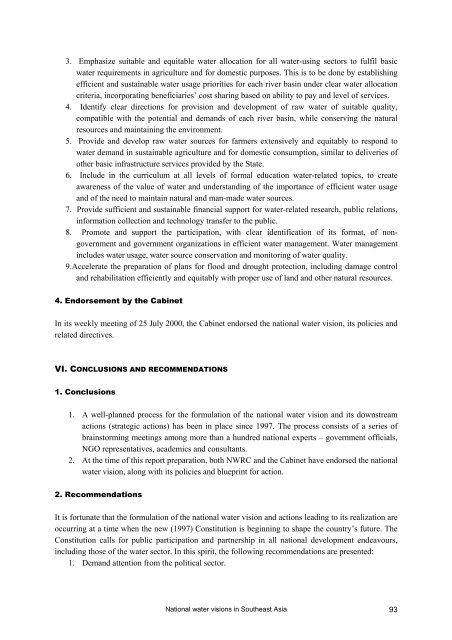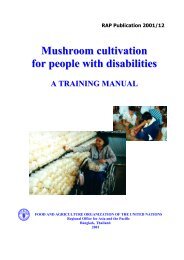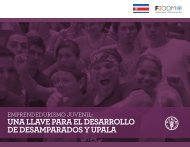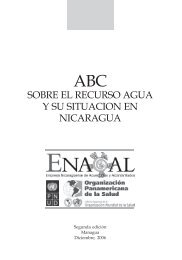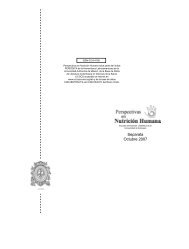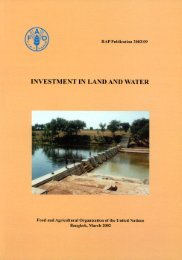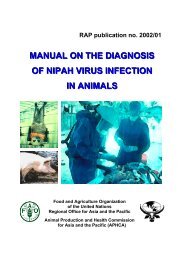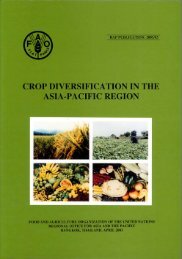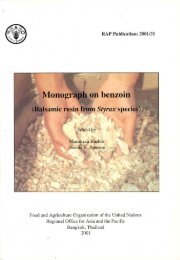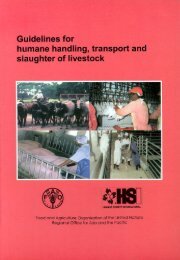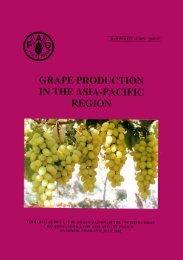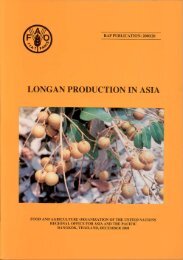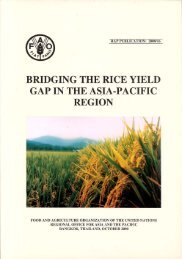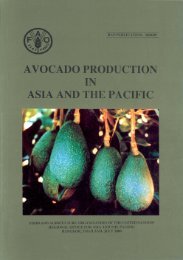The FAO-ESCAP pilot project on national water visions. From vision ...
The FAO-ESCAP pilot project on national water visions. From vision ...
The FAO-ESCAP pilot project on national water visions. From vision ...
You also want an ePaper? Increase the reach of your titles
YUMPU automatically turns print PDFs into web optimized ePapers that Google loves.
3. Emphasize suitable and equitable <strong>water</strong> allocati<strong>on</strong> for all <strong>water</strong>-using sectors to fulfil basic<br />
<strong>water</strong> requirements in agriculture and for domestic purposes. This is to be d<strong>on</strong>e by establishing<br />
efficient and sustainable <strong>water</strong> usage priorities for each river basin under clear <strong>water</strong> allocati<strong>on</strong><br />
criteria, incorporating beneficiaries’ cost sharing based <strong>on</strong> ability to pay and level of services.<br />
4. Identify clear directi<strong>on</strong>s for provisi<strong>on</strong> and development of raw <strong>water</strong> of suitable quality,<br />
compatible with the potential and demands of each river basin, while c<strong>on</strong>serving the natural<br />
resources and maintaining the envir<strong>on</strong>ment.<br />
5. Provide and develop raw <strong>water</strong> sources for farmers extensively and equitably to resp<strong>on</strong>d to<br />
<strong>water</strong> demand in sustainable agriculture and for domestic c<strong>on</strong>sumpti<strong>on</strong>, similar to deliveries of<br />
other basic infrastructure services provided by the State.<br />
6. Include in the curriculum at all levels of formal educati<strong>on</strong> <strong>water</strong>-related topics, to create<br />
awareness of the value of <strong>water</strong> and understanding of the importance of efficient <strong>water</strong> usage<br />
and of the need to maintain natural and man-made <strong>water</strong> sources.<br />
7. Provide sufficient and sustainable financial support for <strong>water</strong>-related research, public relati<strong>on</strong>s,<br />
informati<strong>on</strong> collecti<strong>on</strong> and technology transfer to the public.<br />
8. Promote and support the participati<strong>on</strong>, with clear identificati<strong>on</strong> of its format, of n<strong>on</strong>government<br />
and government organizati<strong>on</strong>s in efficient <strong>water</strong> management. Water management<br />
includes <strong>water</strong> usage, <strong>water</strong> source c<strong>on</strong>servati<strong>on</strong> and m<strong>on</strong>itoring of <strong>water</strong> quality.<br />
9. Accelerate the preparati<strong>on</strong> of plans for flood and drought protecti<strong>on</strong>, including damage c<strong>on</strong>trol<br />
and rehabilitati<strong>on</strong> efficiently and equitably with proper use of land and other natural resources.<br />
4. Endorsement by the Cabinet<br />
In its weekly meeting of 25 July 2000, the Cabinet endorsed the nati<strong>on</strong>al <strong>water</strong> visi<strong>on</strong>, its policies and<br />
related directives.<br />
VI. CONCLUSIONS AND RECOMMENDATIONS<br />
1. C<strong>on</strong>clusi<strong>on</strong>s<br />
1. A well-planned process for the formulati<strong>on</strong> of the nati<strong>on</strong>al <strong>water</strong> visi<strong>on</strong> and its downstream<br />
acti<strong>on</strong>s (strategic acti<strong>on</strong>s) has been in place since 1997. <str<strong>on</strong>g>The</str<strong>on</strong>g> process c<strong>on</strong>sists of a series of<br />
brainstorming meetings am<strong>on</strong>g more than a hundred nati<strong>on</strong>al experts – government officials,<br />
NGO representatives, academics and c<strong>on</strong>sultants.<br />
2. At the time of this report preparati<strong>on</strong>, both NWRC and the Cabinet have endorsed the nati<strong>on</strong>al<br />
<strong>water</strong> visi<strong>on</strong>, al<strong>on</strong>g with its policies and blueprint for acti<strong>on</strong>.<br />
2. Recommendati<strong>on</strong>s<br />
It is fortunate that the formulati<strong>on</strong> of the nati<strong>on</strong>al <strong>water</strong> visi<strong>on</strong> and acti<strong>on</strong>s leading to its realizati<strong>on</strong> are<br />
occurring at a time when the new (1997) C<strong>on</strong>stituti<strong>on</strong> is beginning to shape the country’s future. <str<strong>on</strong>g>The</str<strong>on</strong>g><br />
C<strong>on</strong>stituti<strong>on</strong> calls for public participati<strong>on</strong> and partnership in all nati<strong>on</strong>al development endeavours,<br />
including those of the <strong>water</strong> sector. In this spirit, the following recommendati<strong>on</strong>s are presented:<br />
1. Demand attenti<strong>on</strong> from the political sector.<br />
Nati<strong>on</strong>al <strong>water</strong> visi<strong>on</strong>s in Southeast Asia 93


